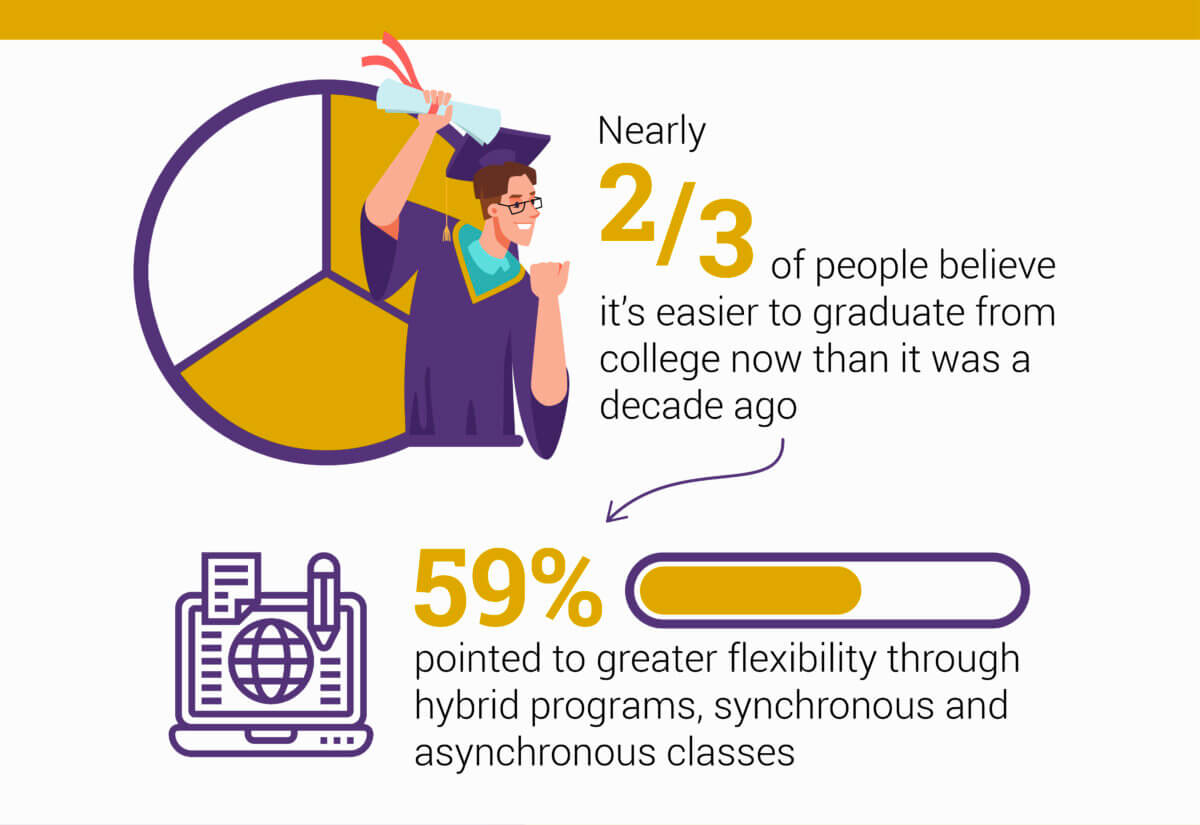NEW YORK — Nearly two-thirds (64%) of people believe it’s easier to graduate from college now than it was a decade ago. According to a survey of 2,000 U.S. adults, including 1,000 college students, about eight in 10 (79%) graduates think currently enrolled students have access to more resources than those in the past.
Over half pointed to greater flexibility through hybrid programs, synchronous and asynchronous classes (59%) as well as more resources online to help navigate college (54%). Additionally, 48 percent noted the increased availability of online options for classes as a factor in easing current students’ path to graduation.
Conducted by OnePoll on behalf of Bellevue University for National Online Learning Day, results also show the average college student experiences six major challenges on the road to graduation, and financing their studies (38%) isn’t the only obstacle. People also reported difficulties balancing obligations outside of their studies (43%), finding effective ways to study (36%), and being a parent or caretaker while enrolled (26%). In fact, 48 percent admitted there was a time when they felt they wouldn’t graduate.
People’s top three factors in selecting a college originally were the programs or classes offered (29%), the cost of the school (27%), and how highly ranked the school was (27%). One in five (21%) also prioritized colleges with a remote/online learning option.
However, two in five (41%) would change some of their criteria when selecting a college if they were to return. Of those respondents, more than a quarter (26%) said an online learning option would be top of mind. If they were to enroll in a college course now, 45 percent would prefer a hybrid class, while 20 percent would want one fully online.

“Working adults are always looking for ways to save time and money, especially when returning to college, so it’s important to prioritize flexibility in your learning environment in addition to ensuring you have access to integrated support,” says Dr. Matt Davis, Executive Vice President and Dean at Bellevue University, in a statement. “Online learning can work for both first-time students balancing various obligations, as well as those seeking their next career promotion or considering a career change altogether.”
Fifty-two percent have already taken an online class, whether for college, further education through work, or another purpose. Among the benefits people have found from online classes, respondents noted they are able to more easily balance class with other obligations (54%), study from their preferred location (53%), and learn at their own pace (49%).
Regardless of their current level of education, the top two factors that would inspire people to enroll in virtual college courses are cost (39%) and availability of courses they’re interested in (38%).
“If you’re considering enrolling in an online university, look for one that’s not only affordable but also has real expertise in offering online degrees with integrated support, and is accredited and nationally recognized by top employers across the country,” Dr. Davis says.
Survey methodology:
This random double-opt-in survey of 1,000 general population Americans and 1,000 college students was commissioned by Bellevue University between Aug. 29 and Sept. 6, 2023. It was conducted by market research company OnePoll, whose team members are members of the Market Research Society and have corporate membership to the American Association for Public Opinion Research (AAPOR) and the European Society for Opinion and Marketing Research (ESOMAR).


It’s easier today because SAT test scores and K – 12 academic performance are oftentimes disregarded in the interest of complying with politically correct policies and agendas. As such, today’s college courses have to be dumbed down in order to maintain the required level of passing students. That’s really the bottom line here, with our entire nation suffering accordingly.
Have to agree! I would be very leery of the impact of politically correct Woke-ness in even the hard sciences these days. Only a few determined colleges such as Hillsdale, Christendom, maybe George Mason, etc. would have my trust in being truly concerned with “real” learning instead of indoctrination. I have taken some IT classes online with community/tech colleges to update my skills when I was working in that field, so am willing to give those benefit of my doubts of the schools overall, but in retirement I don’t care so much about that vocational area (although still would like to learn Python programming for some “dabbling”…)
When all but elite colleges started pretty much open admission the requirements were lowered so kid’s woefully unready were kept in and ultimately graduated. Several experiments have shown most learn nothing during the four years in school.